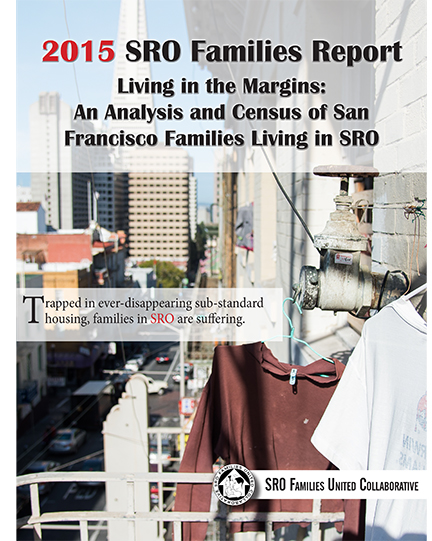In the midst of affluence, San Francisco is facing severe disparities among its residents, with large numbers of people working hard but unable to afford decent housing. A rapidly growing number of families are suffering while trapped in ever disappearing substandard housing. Many of them find themselves barely surviving and living in inhumane conditions in residential hotels or Single Room Occupancy hotels (SROs), which are a last resort in a quickly gentrifying city. Our report finds a population that has been virtually ignored by policy makers. In fact, our internal analysis demonstrates that over the past decade, out of hundreds of families living in residential hotels, only a minuscule 40 families have been given the opportunity to move into subsidized permanently affordable housing.
The SRO Families United Collaborative, composed of five community based organizations in four neighborhoods that include Chinatown, Tenderloin, Mission, and South of Market, conducted its second city-wide census in November 2014 in order to gather information about families living in SRO hotels. This report attempts to draw attention to the hardships that families face when living in SRO’s. We examined their lives, described their barriers, and most importantly, pulled together a set of recommendations compiled from each of these communities to solve this crisis. The time is now for a pathway into decent and affordable housing for our hard working immigrant community currently shackled to the SRO housing market.
Findings
Rising Housing Costs
The cost of housing in San Francisco has been steadily increased by 25% over the past four years, reaching new highs of $3452 median rent for a one-bedroom apartment, as of August, 2015 (Priceonomics). Often, the only affordable housing and the last resort for many families in the City is an SRO.
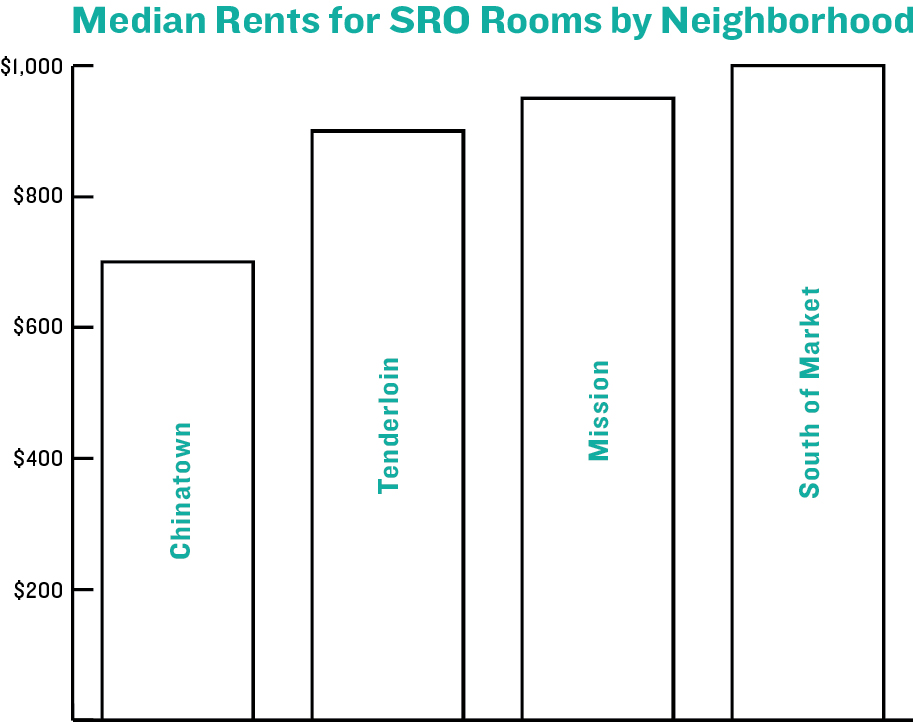
Rising Numbers of Families Crowded in SROs
Compared to the 2001 census, we found an increase of 249 families living in SRO’s across the city. This included a 14% increase of families living in Chinatown, a 5.4% increase in the South of Market. However, due primarily to gentrification families in the Mission have decreased by almost 9%.
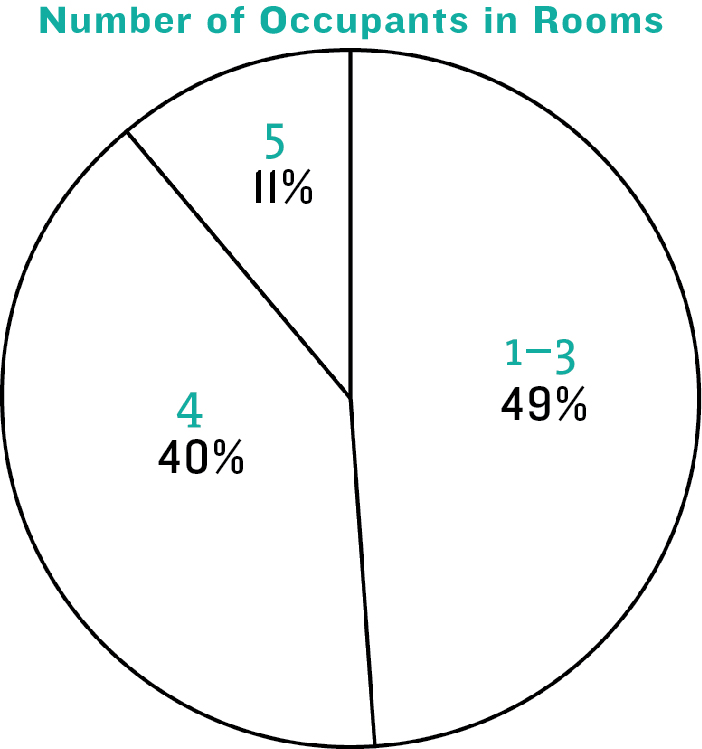
No Tenant Rights While Languishing on Waitlists
While families are waiting for housing for years, we found that most were in the very precarious state of having no tenant rights. 62% of the families do not have a lease or tenants’ rights, putting them at risk of displacement daily, to make room for the growing number of residential hotel rooms used to house white collar workers and students at unaffordable rates. Almost all, (88%) of the families have been on a housing waiting list for more than 1 year, 60% for 3 years or more, and 14% for 10 years or more.
Housing Conditions Hurting Tenants’ Health
- Nearly half of the families (48%) reported that their health had been negatively impacted by living in an SRO. The most common complaint (63%) was respiratory problems, followed by insufficient light (27%), infections due to unsanitary conditions such as mold, led exposure, air pollution, blood in shared bathrooms, rodents and bed bugs, (15%), and sleep deprivation due to noise in the hotel (13%).
- 24% of families have at least a family member who suffers mobility problems, 18% reported visual disabilities, 18% reported respiratory problems, and 9% reported other chronic illnesses. 15% of families have at least a family member in their unit living with a disability or a chronic disease.
SRO Families are Mostly Immigrants
- 62% of the families came from China or Hong Kong.
- Only 14% heads of households were fluent in English. 60% of the families speak a Chinese dialect.
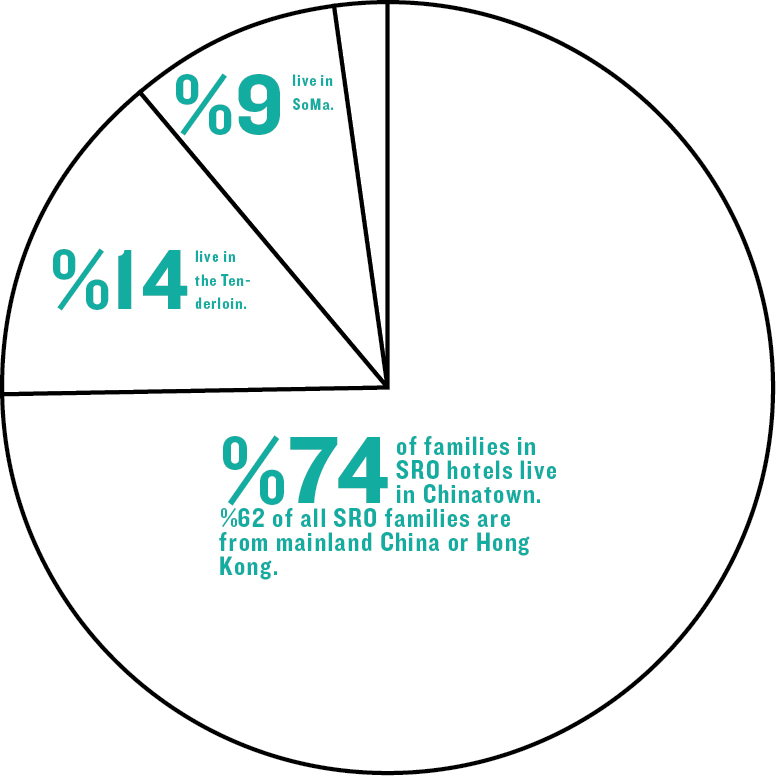
Working Poor Cannot Afford Decent Housing
88% of the families reported salaries as their main source of income.
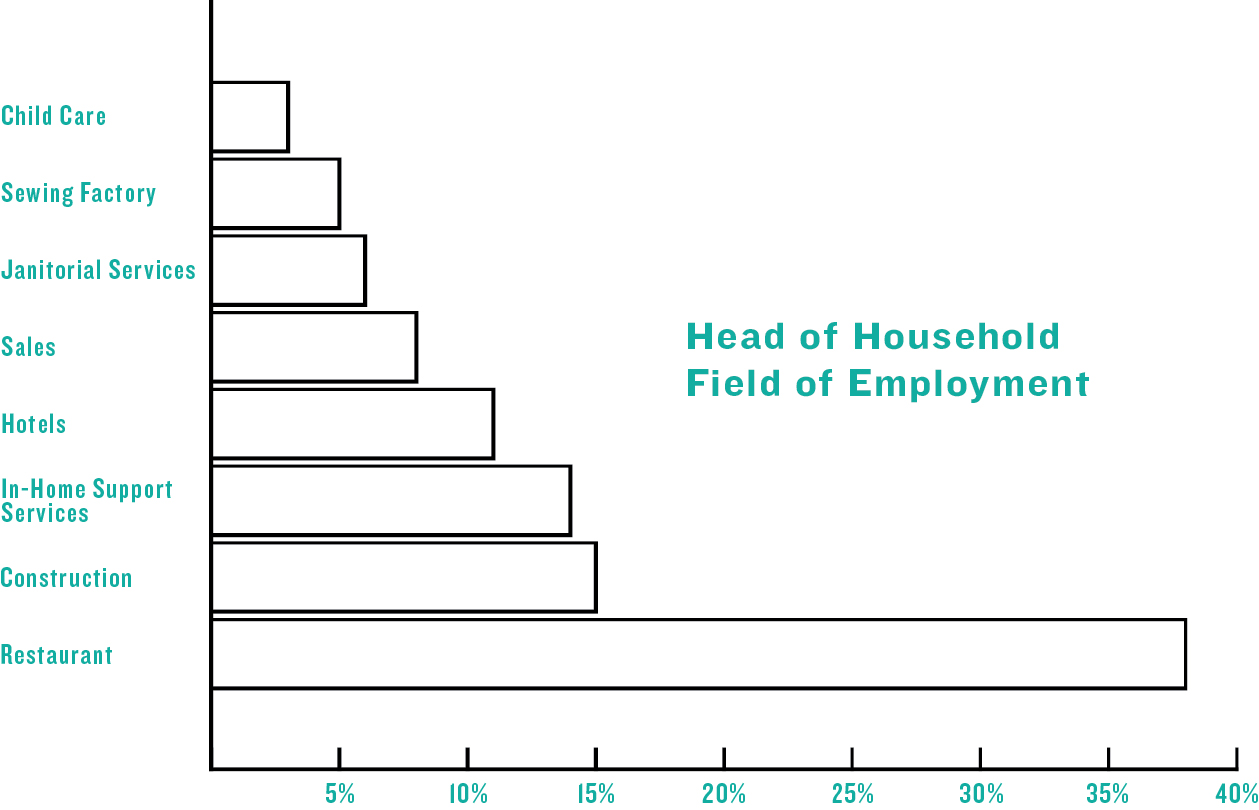
Moving Out of SF Not an Option
Nearly 62% of the families listed lack of social support, community services and public transportation outside of San Francisco as their main concerns if forced to move out of their neighborhood. 29% listed lack of language/cultural competent services outside of San Francisco as their main concern.
Recommendations
Families in SROs Need Access to Decent, Affordable Housing.
For years now, too many parents and their children have been forced to deal with a dangerous and debilitating environment for their everyday lives. Not only do they need decent paying jobs, education, childcare and enrichment to address immediate problems, they also need to be empowered to advocate for their rights and to develop long-term solutions. The SRO Families United Collaborative recommends the following to address the crucial needs of San Francisco’s vastly underserved families living in residential hotels:
Employment:
- Strengthen Labor Laws
The City should continue to strengthen enforcement and education around labor laws. This includes ensuring the Office of Labor Standards Enforcement (OLSE) has adequate tools, resources and multilingual staffing, as well as strong community partnerships to reach the most impacted workers.
- Expand Employment Training
The City should expand funding for successful existing employment training and placement programs that are culturally and linguistically competent, recognizing the unique barriers faced by immigrant workers, heads of households, formerly incarcerated people and others facing barriers to employment.
- Invest in Blue-Collar Job Creation
The City should invest in economic and workforce development in order to generate and support the growth of stable, full-time, living-wage employment opportunities appropriate for limited English speaking blue-collar workforce, which would directly address the income crisis faced by 90% of the families who are employed but cannot move out of the SRO’s due to income restriction.
- Stabilize Small Businesses
The City should take actions to stabilize small businesses ability to survive, and include parameters on labor conditions.
- Target City Jobs for Limited English Speakers
Target City jobs for limited English speakers and identify creative ways for SRO families to overcome language barriers to jobs.
- Provide Job Training Opportunities with Stipends
Enhance vocational services for parents living in residential hotels and their children. Schedule vocational education classes. Find suitable employment opportunities that offer salaries to afford safe and decent housing.
Eviction Prevention through Legal Aid:
- Keep Families Housed
We recommend that a planning process be formulated to make dynamic system changes to the fully funded prevention system in order to identify families that are at risk of displacement and to connect them to ongoing support to maintain their housing.
- Increase Access to Eviction Prevention Legal Services
We have observed a continuous and increasing number of families seeking support to fight evictions, as many tenants receive illegal unlawful detainers (UDs), which require immediate legal response.
Housing:
- Ensure Eligibility for SRO Families
The City should include families residing in SRO hotels as eligible for all City-funded housing targeting homeless people.
- Set Aside Housing Targeting the SRO Family Population
Our report found that families living in SRO’s have experienced a disparate lack of access to the city’s affordable housing. We recommend that the City sets aside affordable housing for Area Median Incomes 2030% AMI and 30% to 50% AMI specifically for families residing in SRO’s.
- Ensure Preferences for Families Residing in Residential Hotels for Public Housing
We recommend that the SFHA also accept referrals from Department of Building Inspection (DBI) who manages and funds the SRO Families United Collaborative.
- Increase Affordable Housing LOSP Subsidies within the Communities Where SRO Families Currently Reside
The Coalition on Homelessness “Roadmap” is calling for an increase of 375 of such units through 2020, and of those we are recommending that 277 be set-aside for families residing in SRO’s.
- Place Homeless Households Residing in SRO’s in Turnover Non-Profit Housing
Part of the solution is to create a new way of using the subsidies program: upon vacancy, housing developer volunteer units in existing affordable housing developments to be designated as homeless units, and would receive the difference between what the resident could afford and the unit rent as subsidy funding from the City.
- Move Homeless Households into Vacant SFHA Units
According the San Francisco Housing Authority, there is an average of 6 units per month in their portfolio turnover. We recommend whenever possible, without holding up construction, that units be turned over to homeless households, including those residing in residential hotels with minor children.
- Fund Need Based Subsidies
Last year we created a new pilot subsidy program that recognizes the need for long term housing subsidies and fills a gaping hole in our system. We are proposing a further expansion next year, to create house an additional 80 households in 2016, of which a portion should be for families currently residing in residential hotels.
- Halt the Conversion of SRO’s into Student Housing and Co-ops
We would like legislation that will halt the conversion of SRO’s into student housing and coops, thus protecting and preserving SRO buildings for low-income households.
Education:
- Better Tracking Through Schools
There are 499 children in grades K–12 living in SRO’s in Chinatown alone. The San Francisco Unified School District (SFUSD) reports they have 294 homeless students living in residential hotels, a very low figure. The San Francisco Unified School District should reach out to families to ensure that those living in residential hotels are not only counted but offered services through the school district for which they are entitled.
- Provide Funding for a Beacon Center in Chinatown
Families reported that having no place to go after taking their children from school, their children would have to confine to the cramped SRO room. Provide funding for a Beacon Center in Chinatown, specifically targeting high needs SRO’s, homeless and public housing families. In addition, the program needs a family focus approach that is customized for the entire SRO family.
- Secure Promise Neighborhood Designation for Chinatown
A Secure Promise Neighborhood Designation for Chinatown would focus Federal assistance on projects that are designed to create a comprehensive continuum of solutions, including education programs and family and community supports. The continuum must be designed to significantly improve the educational and developmental outcomes of children and youth, from birth through college and to a career.
- Better Use of Community Space
Identify and better utilize community spaces for use after work hours; and connect SRO families to the Presidio with shuttle service.
- Create Free Rec and Park Card
Create programs for high need service areas targeting low income neighborhoods.
- Provide Free Transportation
Provide free transportation to enjoy parks and recreation areas outside of San Francisco through bringing back Park and Rec’s bus program targeting SRO and homeless families.
- Develop Childcare Respite Program
Develop childcare respite program for SRO parents where parents can “drop off” children at childcare programs, relieving parents for a couple hours.
- Provide Culturally Diverse Staffing
Provide culturally diverse staffing and competency in homeless services. Limited and non-English speaking SRO and homeless families are less likely to seek and find help for their multiple needs.
Building Improvements, Tenant Empowerment and Civic Engagement:
- Provide More Outreach and Housing Counseling Services
The majority of SRO families are living in aging buildings needing repairs and problematic wiring systems that are often overloaded. In addition, SRO families are bearing the threat of eviction and gentrification.
- Mandate Buildings to Allow Access to Peer Organizers
DBI must mandate that buildings allow access to our Peer Organizers, either through legislation or by any other means available to them.
- Promote Civic Engagement Activities
Given the current political turmoil around housing in San Francisco, it is essential to have families involved in the political process to ensure that their voices are heard and their needs are met.

